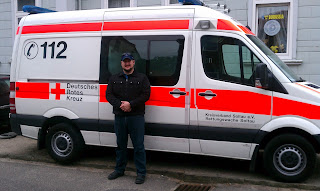My first week in Germany was a mixture of amazing sights and exhaustion. After a 17 hour trip plus a 7 hour time difference I was needless to say ready for a nap when we got to our host family's home. Horst, Inge and Ämi (their black lab) were wonderful hosts. They let me sleep for an hour or two after we arrived! I woke up to a most enjoyable dinner of fresh bread, cheeses and various cold cuts of meat, and of course one or two cold beers!
The view from Horst and Inge's dining room was so beautiful. Inge plants all the flowers and bushes, and the trees were already there! It was so nice, we had to eat on their patio as well. Sitting in the cool air with some coffee and bread talking about world issues was right up my ally!
As Sarah said, we got had the opportunity first to visit Soltau and then Hamburg. It was wonderful to see so many people out shopping in the town market, riding their bikes through the parks and just meeting with each other, real "old world" flavor.
My first Vocational day!
The company I rode with is Deutches Rotes Kreuz, the German Red Cross. They were a fantastic group of people and I was very lucky to have such understanding and helpful colleagues to help me with speaking the correct phrases in German. Actually, all the things relating to the job were so close in pronunciation that we communicated very effectively about working as paramedics or Rettungsdienst, as they are known in Germany. In America, we have EMT-Basic, Intermediate and Paramedics; in Germany the Basics are called Rettungsassistant, and an ambulance "eine Rettungswagen". As a side note, I was a bit surprised to see that I was fairly average in height there! Dany (on my left) had me beat by at least 7-10 inches and maybe 10-20 pounds haha.
The day began much like it does for me normally at home. Within 30 minutes of arrival at the station, we had a call... I didn't yet have a chance to look over the rigs and see what was what, so for this one I just stood and watched. A respiratory distress patient, with COPD, much like I see day to day at home. Similar questions, similar order of techniques up to the use of pharmacological interventions. The cots were very nice, but it was odd to me that there were two sets of wheels at the head of the cot. One set was rigid for travelling and locking into the cradle, the other was on bearings to allow for the back to be steered around corners, and to activate this second set, a lever was used by the thumb and you pushed the cot down slightly to move it onto those wheels.
I was also impressed that all of their rigs were equipped with power load/unload ramps for the cots. The crews were quite thankful for the reductions in back pain and the patients for a much smoother ride. You could even make the cot float on pneumatic shocks while in transit!
The company also has a very wide range for where it will go to pick up patients, a rough circle almost 80km in diameter! From just south of Hamburg to just north of Hannover! Almost twice the size of my response area.
When we got back, I asked to get a better view of the back of the rigs and a run through of how they handle various situations. I asked what kinds of drugs they use and was told they even paramedics can only use the most basic of medications without the doctor present. I was shocked that they have full on doctors on staff in chase cars with a whole pharmacy in tow that responds to calls with the ambulance. Full time! The translated names were mostly of the same chemical names I was used to, so I knew most of their choices already and we could talk effectively about treatments for various illnesses. Some drugs they used on a regular basis I had only read about in school or had seen used in the ER, and some that I use they could not ( Das ist verboten!)
I asked about average pay scales as well, and when converted to dollars, most emergency personnel (minus doctors, of course) make a similar amount to me every week. The big change was that they only work 12 hours at a time, and cannot work more than 10 hours of OT before they must rest for 12 hours. Not like my 4 day straight work weeks at home! Haha. Call volume was slightly less though, with only 3-4 calls a day for each truck versus the 5-8 for our service. Perhaps this was because they have so many rigs working in one day. 5 crews of two were working today; two doctor/paramedic teams in a chase car, 2 paramdic/medic or basic teams in two rigs, and one transport car that served a similar function to a medivan at home. They were all manual transmissions as well, which is cheaper in Europe than automatic.
All in all a fantastic day of learning and adventure. The beautiful countryside was just how I pictured it, and I could see why so many German families chose to settle in the Ohio Valley and especially Illinois. Lots of hills and Grünwald! (Woods)






















